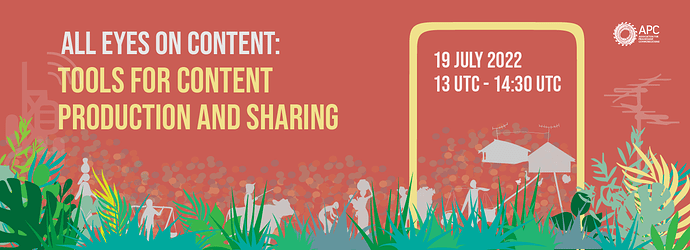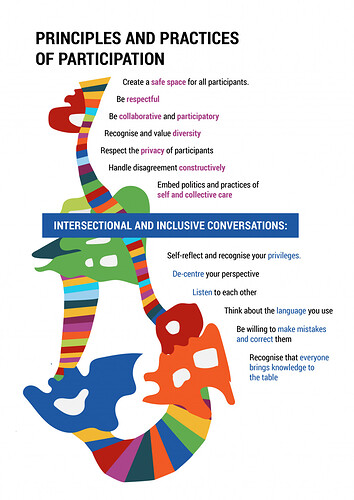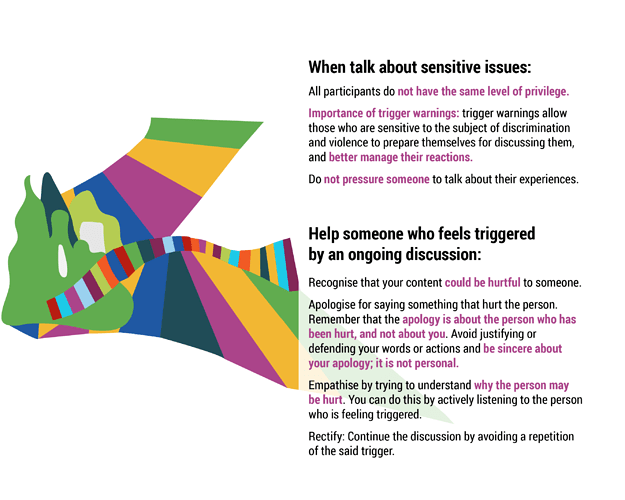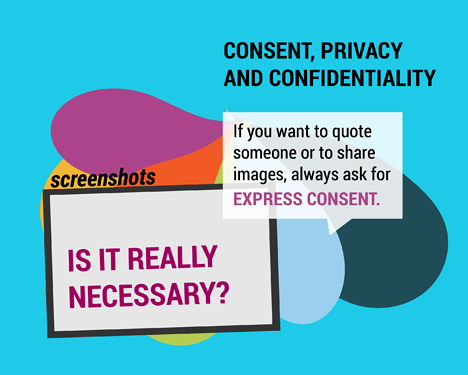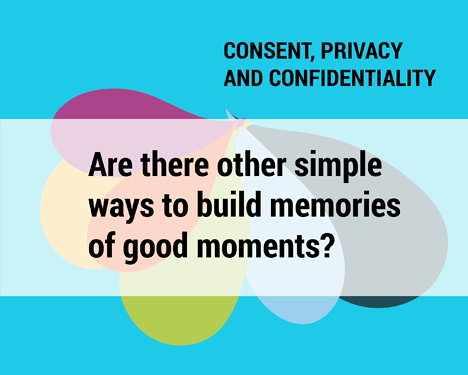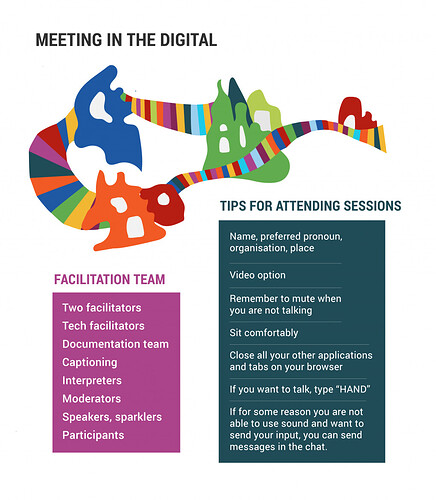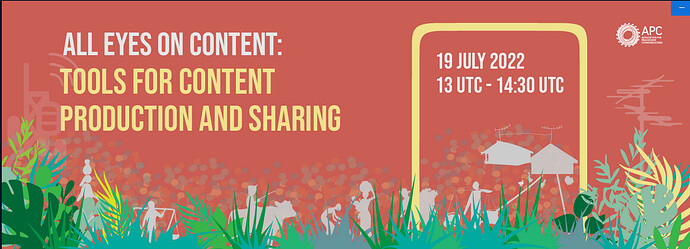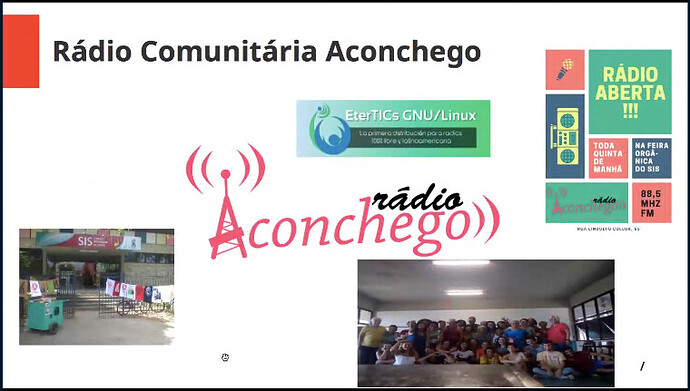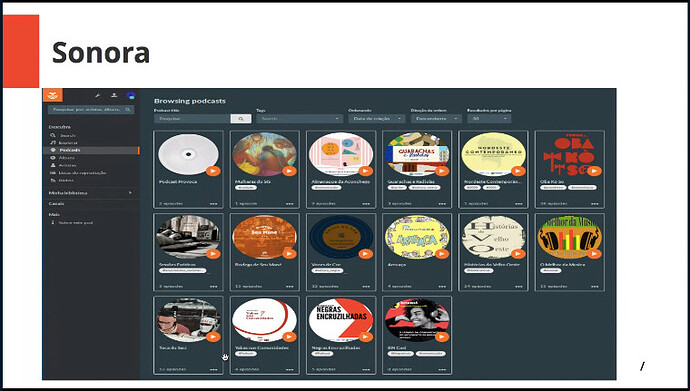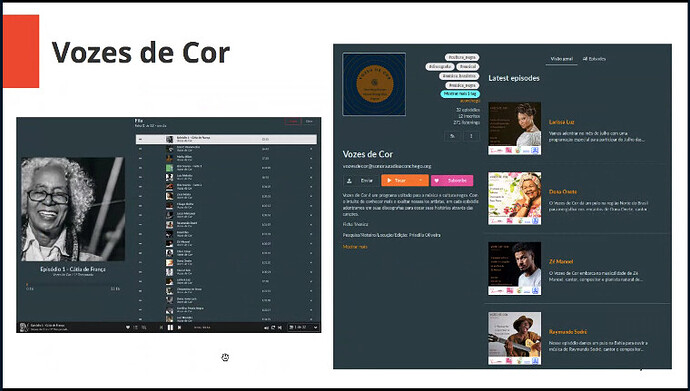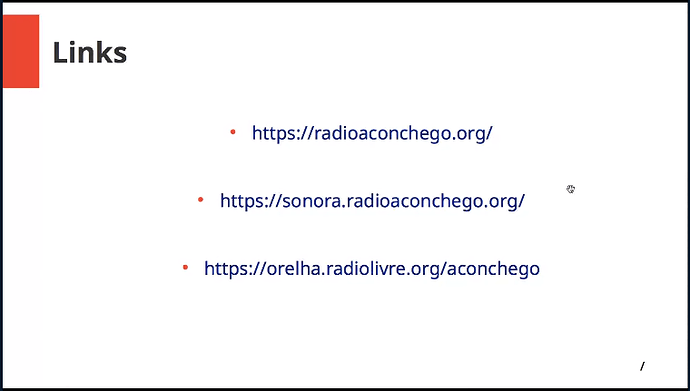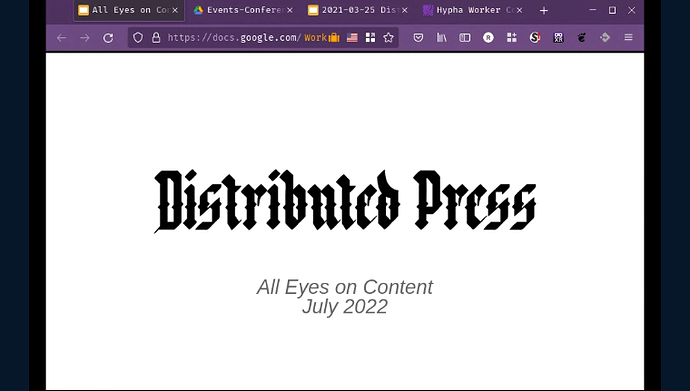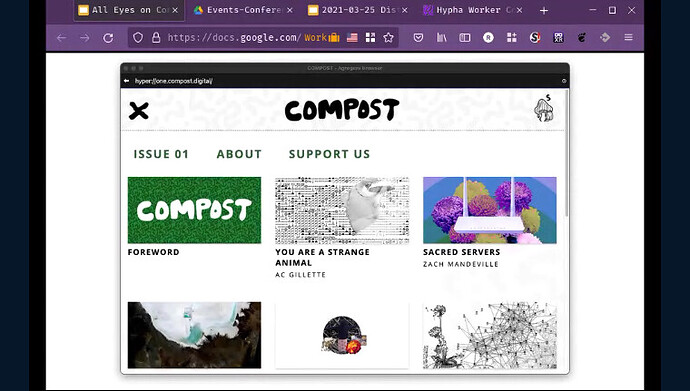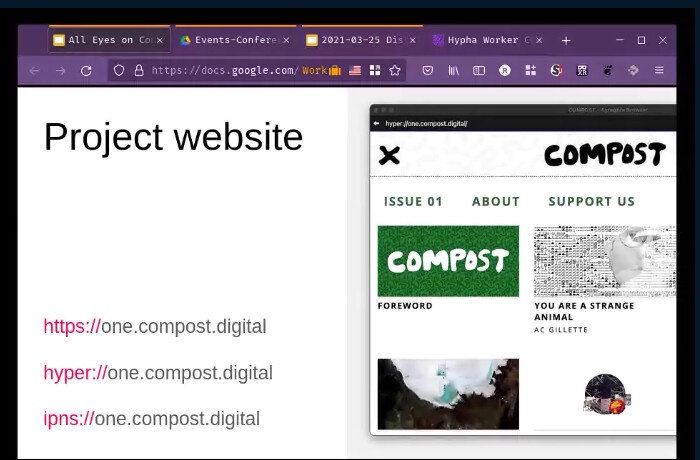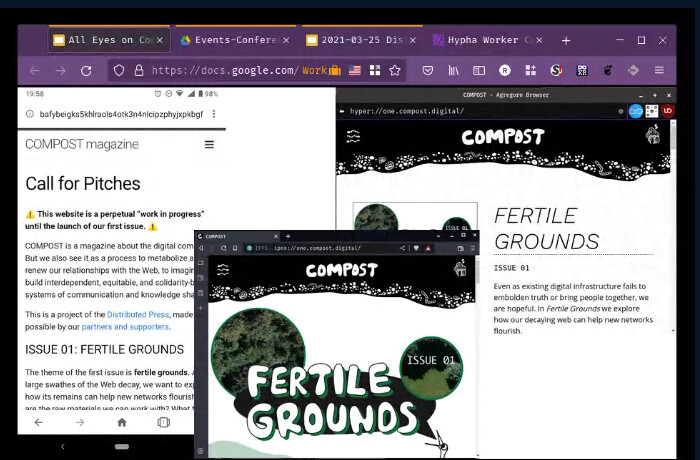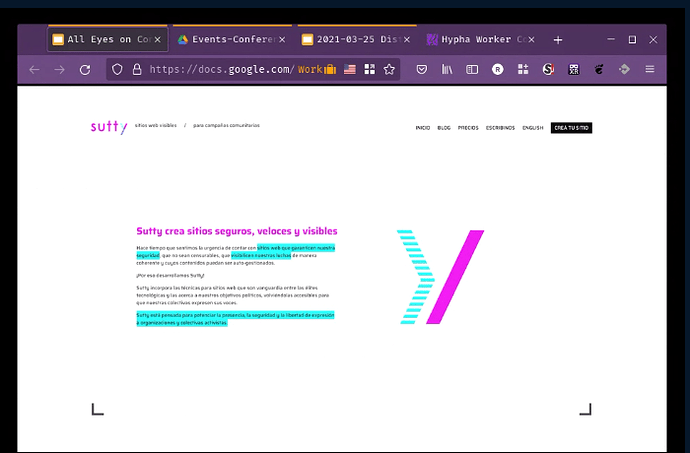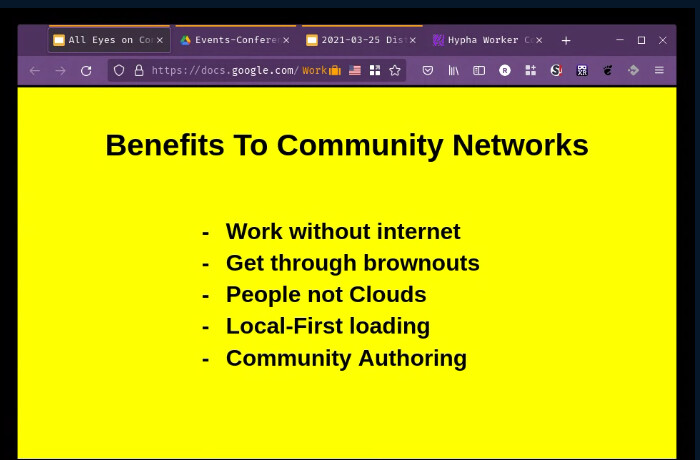Live transcription
Nico Pace: welcome to this webinar, we’re ready to start. Hi everyone, this webinar is part of a series, the tech talk webinars, we have been doing for more than one year. This All Eyes on Content second encounter aims to share a little about the process of telling stories and tales. We have amazing people here that will talk about tools we can use. We have live interpretations of Spanish and English (there is a blue globe in the bottom of the screen where you can choose your preferred language). We also have noted, that you can find them here in this forum/space. You can follow them and also edit them, please add links and info and help us to make notes that are useful for everyone.
Here in this forum, you will also find the principles of participation, please check them out and let us know if there is any doubt. I am passing the mic to the facilitator, Maria.
María Alvarez Malvido Thank you Nico for the invitation and great introduction. It is an honour to be here with such great speakers and experiences. Personally I learned a lot from experiences like the ones we will listen to today. Through community networks, there are great experiences and knowledge to think about access not as an end in itself but as means to learn from what is happening in the territory. FM radio, distributed protocol, film-making - I’m glad to learn from these amazing people and the process you are involved with.
I will do a quick intro of the speakers and they can also introduce themselves. Pls, share questions and comments you may have, feel free to use the chat for it.
(the facilitator is presenting the speakers, see more info about them above). Thank you all for being here. Start with Saisudha Sugavanam.
Saisudha Sugavanam : Thank you all, Maria and APC. India is a very diverse country (language, geography), and we have multiple challenges. While the diversity is beautiful, it presents challenges for us and also many opportunities to communicate with the population. The community radio movement started in 2004, we have 384 licensees for community radios across the country. It is not enough to solve the broadcast problem in the country, but a great achievement. Today I will present a story from one research I recently co-author.
Link: Community radio enabling women's empowerment in remote communities of India | Association for Progressive Communications
This is a region where villages, with many social challenges - lack of energy, child marriage, unemployment. Because of the lack of infrastructure, it was hard to travel to the region. Power outage happens every day. The community youth was thought, after weeks of training, they set up the community radio and manage to get a power supply. So the next challenge: they don’t have listeners, people from the region didn’t have access to any form of media in the past, and they were not familiarwith to listening radio broadcasts. Try to gather the audience and play the programmes every chance they have, to build the listener’s base. Once they get regular listeners, a woman volunteers (name will not be revealed). There was a practice in these villages where man abandoned their wives if they don’t have a male child. This woman deliver a second baby and it was a girl. She walked out of the marriage. The community radioallow hery to stand on her own, she was not abandoned, and she decided to walk out of the marriage and volunteer for the radio. After a while, the issue was being discussed on the radio, the husband reflect, and a conversation was created. It created a space for the village to discuss this.
Okoro Onyekachi Emmanuel Good afternoon from Nigerian time. Thank you for having me here. I’m also a filmmaker. Nigeria is one of the biggest countries (size and population) in Africa, very dependent on oil. We have been exporting oil for many years, but the impact of oil exploration is not always seen (pollution, impacts on communities). It happens mainly in poor communities. How does it affect people’s life, health, and crops? We have been having challenges as activists, we put a lot of research reports, and video content, but we still have the same things happening - oil pollution, people dying of all the impacts. We engaged with several partners and with the support from APC we develop a very innovative project. There are no numbers tied to this environmental pollution. We get support to develop air sensor devices in the communities. Communities were not able to measure the pollution in the air. All the pollutants that fill the air - people knew that this was poisoning, but without the numbers, it was not taken that seriously. And we are using these numbers to engage with stakeholders. Nigeria is a bit different from otherAfricana countries, a community radio license is very hard to get here, but there arecommunity-oriented radio stationsd. They help us to disseminate the measure we were doing in 15 communities. We also engaged stakeholders so they are part of the process. Our take is: if people (indigenous, environment defenders)… show this level of pollution is quite high and we need an urgent response. The sensors need connectivity to share the information they gather. I will be happy to answer questions and talk more withanyonee interested on this.
Link: www.datacab.org This portal collects data readings from the air quality monitoring sensors.
Priscilla Oliveira: (notes in Portuguese, English interpretation is available) Bom dia. Eu falo do estado do Piaui, no Nordeste do Brasil, eu faço pare da radio comunitária Aconchego.
Link: https://radioaconchego.milharal.org
A gente se descreve como um coletivo de comunicação popular da cidade do Recife, que é onde eu morava antes. Eu cheguei nessa rádio em 2018 com a idea de apresentar minha pesquisa musical. eu nunca tinha tido esse contato com rádio, muito menos com rádio comunitária, e uma gama de coisas me foi apresentada – como o software livre, o funcionamento da rádio. A minha intenção era apresentar a pesquisa musical, mas eu fui conhecendo a rádio. Saci que é a pessoa que cuida da infaestrutura me apresentou várias coisas pra que eu pudesse entender as ferramentas que se usa na rádio antes de começar a fazer programs - desde a divulgação, a edição de aúdio, o site.
Na rádio atualmente somos 3 pessoas, elajá existe há 7 anos (fez aniversário em junho). Priscilla cuida da parte musical, Gustavo da edição e Saci da infraestrutura. Antes da pandemia, estavamos na FM também, mas precisamos siar por conta do processo da pandemia.
Lembrando que a gente se denomina rádio comunitária pelo trabalho que a gente faz, mas não temos licença, é muito difícil conseguir a outorga no Brasil. Dura anos, é fácil desistir desse processo pelas dificuldades.
Nosso processo de distribuição de conteúdo, as ferramentas que a gente usa é toda de software livre. No slide (acima) você pode ver nossa plataforma, chama Sonora, tem os conteúdos que a gente produz e conteúdos de parceiros também. Faz o arquivo por aqui também (antes usou o archive.org), os conteúdos tão todos aí no Sonora agora.
Além dessa plataforma, também usamos um blog, que a gente chama de nosso jardim digital.
Nesse slide (acima) você podever um programa que eu produzo, chamado Vozes de Cor, que traz a produção de artists negros no Brasil. Atualmente, eu estou produzindo a 2a temporada, já teve uma primeira temporada de 24 episódios. É um panorama dos nossos artistas, das nossas vozes negras. Está no 10o episódio da segunda temporada, muito orgulho.
Este slide traz os lugares onde nós divulgamos nossas produções:
https://radioaconchego.milharal.org/
http://orelha.radiolivre.org/aconchego
É isso, eu não sou uma pessoa muito da técnica, mais focada na produção de conteúdo, mas se tiverem perguntas eu vou tentar responder e também posso encaminhar pro Saci aqui do meu lado. Muito obrigada.
Mauve: Hello, I’m Mauve and will be talking about distributed.press (P2P and distributed protocol).
We want to publish our blog at decentralized web.
One of the first parts of developing the tool was about developing the content we would distribute at the tool. We develop the Compost magazine. The group established a governance framework, which is published on the website.
Once we put the content together, we use a ??? protocol, so people could download it. Once content is published people can access it trought their browser.
Unlike WordPress, we don’t need a server or a cloud, e don’t lock the content inside a server, people can publish it and share it across the network.
All the API stuff is behind the hood, so people can focus on producing the content.
How can make projectsproduceg content more sustainable?
A linkont the website tellspeoplee how they can support.
Regular subscriptions being or blockchain-typesubscriptionss like bitcoin… easy to parse and create custom backends.
It is really important how we can benefit community networks and take full advantage …A decentralizedd web a way to be not sodependentt on the web.Everyonee uses internet based systems…
your network isn´t going to be as reliable … by usingtheses tools …
(will transcribe later from recording)
Rather than having peoplebringg in Internet-in-a-box, we focus on communities creating their content.
The distributed press is what we are building.
How can this benefit CNs? it could be a way of not being so dependent on the internet. By using these tools we can focus more on people than in clouds or corporations, Ir is to load the local content locally. It is less dependent on this cloud infrastructure. Community to author content, we want to make it easier for people to share, without worrying about get block to distribute. Rather than having people bring internet in a box and archive where people consume content, people can create and consume content in their local language. We are building up networks of people and projects to figure out the tech challenges so people can focus on the social challenge, If this is something you are interested in using in your community we can find ways to collaborate, we would like to work with you.
María Alvarez Malvido - there are questions in the chat.
Question: How are people found for getting slots on the radio?
Is it volunteer based, or is it an active process of searching?
Through phone-ins. They also bring in experts, like say this is a drought-prone region, the NGO gives them saplings of dragon fruit plan and also call in people who have practised this. They are a guest speaker and people can do a call-in.
María Alvarez Malvido Some of you have shared long journeys and community processes and needs, and somehow in the process found FM or distributed radio, film as a way of communicating on what you are creating and supporting local processes. I would be interested to hear your main challenges in using these tools. What are the challenges you face and what strategies you have used to overcome these challenges? These questions are for anyone who wants to jump in.
Okoro : they have been very participatory. Seeing their communities and sharing their stories, they have given people a voice. With the use of low-cost phones, they are able to document and engage in the campaign and seek environmental justice. I am now in a community, that has Shell pipelines, they are currently suing Shell for damages of oil spills. They are using empirical data coming from these devices as well as research done in the community. The reaction of audio visual is participatory here in the Niger Delta. ’
Mauve is this a service to pay monthly? there are expectations around technologies and some of things we are doing is setting different expectations. Finding the people to speak to are difficult. We are meeting people where they are, rather than making something and explaining to folks. In this space, we have this expertise, but where can we meet?
María Alvarez Malvido Many links have been shared in the chat. Also many things happen afterwards that we do not know about.
Okoro Mauve answered some of the questions we had. We had a question of how to have reliable internet. But seeing the decentralised protocols, it would be nice to see the options of sharing content. For us, deploying the devices is done, but internet use is a challenge for us, as we have to get people engaged in the community interest and their language. We need a lot of content. I will send an email to Mauve very soon.
Mauve: sensor data: there is experiments in rural USA, sensor data can be sent from farms to their house. There are people doing transfer protocols. The visualisations is a lot more active to figure out. How do we show the data is a big question. We can talk to other groups about this and focus on the actually using it.
Priscilla: (Portuguese notes) Sobre as dificuldades, pra mim inicialmente foi aprender a mexer nessas ferramentas de software livre, mas atualmente eu consigo usar bem. A gente sente a dificuldade que as pessos colocam quando a gente fala que trabalha com software livre, sempre tem um questionamento, pessoas perguntam por que usar o software livre e não as plataformas cooporativas. Na divulgação também há esse tipo de cobrança, usar redes sociais, plataformas coorporaivas. A gente pensa no nosso próprio jeitode divulgar, falta abertura das pessoas para as alternativas livres. Obrigada.
Sarbani: what is the authenticity of the data that is shared by the community? Does someone curate these and then share?
and if the community is non literate then how do they access the content? Is there an application or voice enabled system that leads them to the content?
Mauve That’s kinda hard since you need a “network of trust”, as in trusting that the person collecting it isn’t lying. There’s potential tech solutions to this, but I’m personally in favor of people showing they’re accountable and open in the way they do their work
Sarbani: we deal with low literacy and people being unable to access content
Mauve: I think some groups like mapeo have useful insights on voice interfaces and using local icons. I think developing whatever application in tandem with people on the ground is needed since there’s no one size fits all.
Sarbani: yes, it is sort of difficult and indeed the same solution does not apply to every community
Mauve : Yeah, I personally don’t know how people adopt platforms.  But that’s something I worry about too. It’s also hard to compete with wealthy corporation that can dump money onto governments and advertizing to spread
But that’s something I worry about too. It’s also hard to compete with wealthy corporation that can dump money onto governments and advertizing to spread
:
Huire: Hi @Mauve, thanks for your explanation. Is this protocol you use a data protocol?
Mauve : @Hiure we use a bunch of protocols at once actually. We use hypercore-protocol which is the new version of Dat, but also IPFS and maybe BitTorrent in the future.
